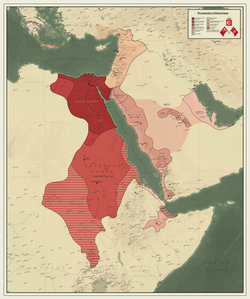
Back الخديوية المصرية Arabic مصر الخيديويه ARZ Xedivatu d'Exiptu AST Misir xidivliyi Azerbaijani Khedivat Egyptn BAR Egyptské chedivství Czech Khedivat Ägypten German Χεδιβάτο της Αιγύπτου Greek Jedivato de Egipto Spanish Egiptuse khedivaat Estonian
Khedivate of Egypt الْخُدَيْوِيَّةُ الْمِصْرِيَّةُ (Arabic) Al-khudaywiyyah al-misriyyah خدیویت مصر (Ottoman Turkish) Hıdiviyet-i Mısır | |||||||||||||||
|---|---|---|---|---|---|---|---|---|---|---|---|---|---|---|---|
| 1867–1914 | |||||||||||||||
| Anthem: (1871–1914) Salam Affandina | |||||||||||||||
 Egypt and its expansion in the 19th century. | |||||||||||||||
| Status | Autonomous vassal of the Ottoman Empire, de facto independent and sovereign state (1867–1914) | ||||||||||||||
| Capital | Cairo | ||||||||||||||
| Common languages | Arabic, Ottoman Turkish, Albanian, Greek,[1] French, English[a] | ||||||||||||||
| Religion | Sunni Islam, Coptic Christianity | ||||||||||||||
| Government | Constitutional monarchy | ||||||||||||||
| Khedive | |||||||||||||||
• 1867–1879 | Isma'il Pasha | ||||||||||||||
• 1879–1892 | Tewfik Pasha | ||||||||||||||
• 1892–1914 | Abbas II | ||||||||||||||
| British Consul-General | |||||||||||||||
• 1883–1907 | Evelyn Baring | ||||||||||||||
• 1907–1911 | Eldon Gorst | ||||||||||||||
• 1911–1914 | Herbert Kitchener | ||||||||||||||
| Prime Minister | |||||||||||||||
• 1878–1879 (first) | Nubar Pasha | ||||||||||||||
• 1914 (last) | Hussein Roshdy Pasha | ||||||||||||||
| Historical era | Scramble for Africa | ||||||||||||||
• Established | 8 June 1867 | ||||||||||||||
• Suez Canal opened | 17 November 1869 | ||||||||||||||
| 1881–1882 | |||||||||||||||
• British invasion in the Anglo-Egyptian War | July – September 1882 | ||||||||||||||
| 18 January 1899 | |||||||||||||||
• Disestablished | 19 December 1914 | ||||||||||||||
| Area | |||||||||||||||
• Total | 5,000,000 km2 (1,900,000 sq mi) | ||||||||||||||
| Population | |||||||||||||||
• 1882[b] | 6,805,000 | ||||||||||||||
• 1897[b] | 9,715,000 | ||||||||||||||
• 1907[b] | 11,287,000 | ||||||||||||||
| Currency | Egyptian pound | ||||||||||||||
| |||||||||||||||
| History of Egypt |
|---|
 |
|
|
The Khedivate of Egypt (Arabic: الْخُدَيْوِيَّةُ الْمِصْرِيَّةُ or خُدَيْوِيَّةُ مِصْرَ, Egyptian Arabic pronunciation: [xedeˈwejjet mɑsˤɾ]; Ottoman Turkish: خدیویت مصر Hıdiviyet-i Mısır) was an autonomous tributary state of the Ottoman Empire, established and ruled by the Muhammad Ali Dynasty following the defeat and expulsion of Napoleon Bonaparte's forces which brought an end to the short-lived French occupation of Lower Egypt. The Khedivate of Egypt had also expanded to control present-day Sudan, South Sudan, Eritrea, Djibouti, northwestern Somalia, northeastern Ethiopia, Lebanon, Jordan, Palestine, Syria, Greece, Cyprus, southern and central Turkey, in addition to parts from Libya, Chad, Central African Republic, Democratic Republic of Congo, and Uganda, as well as northwestern Saudi Arabia, parts of Yemen and the Kingdom of Hejaz.[5][6]
The United Kingdom invaded and took control in 1882. In 1914, the Ottoman Empire connection was ended and Britain established a protectorate called the Sultanate of Egypt.
- ^ Ekmeleddin İhsanoğlu (2012). "Turks in the Egyptian Administration and the Turkish Language as a Language of Administration". In Humphrey Davies (ed.). The Turks in Egypt and their Cultural Legacy. Oxford Academic. pp. 81–98. doi:10.5743/cairo/9789774163975.003.0005. ISBN 9789774163975.
- ^ Holes, Clive (2004). Modern Arabic: Structures, Functions, and Varieties. Georgetown Classics in Arabic Language and Linguistics (2nd ed.). Washington, D.C.: Georgetown University Press. ISBN 978-1-58901-022-2. OCLC 54677538. Retrieved 14 July 2010.
- ^ Bonné, Alfred (2003) [First published 1945]. The Economic Development of the Middle East: An Outline of Planned Reconstruction after the War. The International Library of Sociology. London: Routledge. p. 24. ISBN 978-0-415-17525-8. OCLC 39915162. Retrieved 9 July 2010.
- ^ Tanada, Hirofumi (March 1998). "Demographic Change in Rural Egypt, 1882–1917: Population of Mudiriya, Markaz and Madina". Discussion Paper. No. D97–22. Institute of Economic Research, Hitotsubashi University. hdl:10086/14678.
- ^ "حدود مصر في عهد الخديوي إسماعيل – خرائط". elnabaa. 21 December 2016.
- ^ "خرائط نادرة لحدود مصر الخديوية". toraseyat. 15 May 2017.


